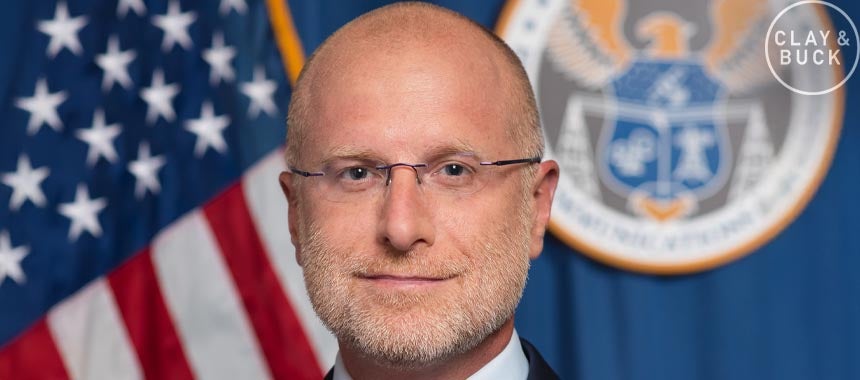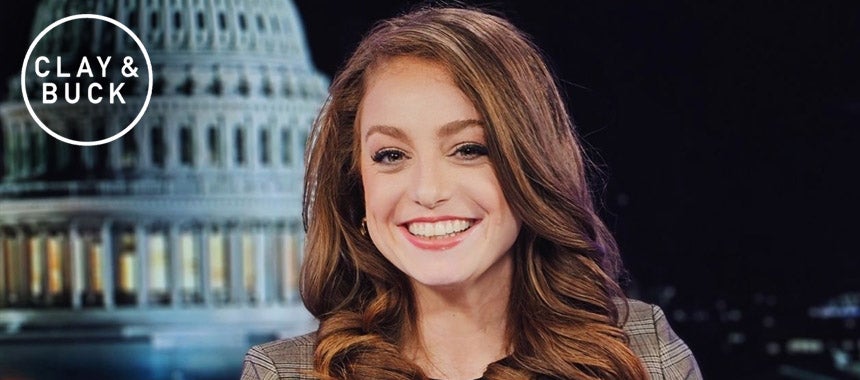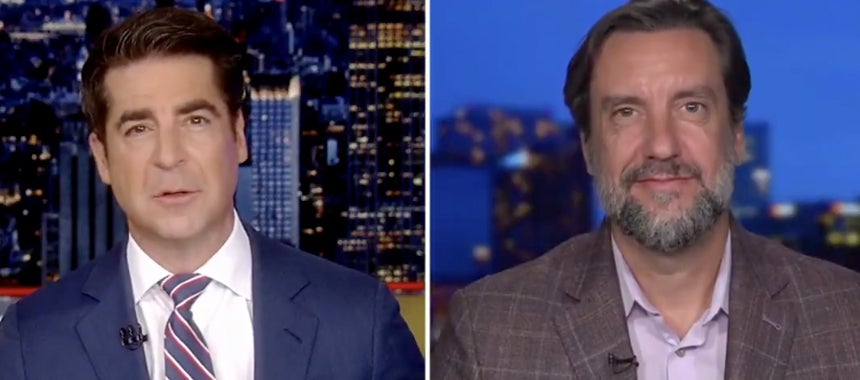Demonization of Cops Hits Grand Rapids
20 Apr 2022
CLAY: There are BLM protests that are breaking out right now in Grand Rapids, Michigan, over a police shooting that has begun and is actually occurring as we speak. It’s interesting because we started off the show talking about the fact that thousands more — according to the date that has come out from 2020, thousands more — black people have been murdered in 2020. It went up by thousands over prior years, in the wake of BLM protests and the demonization of police movement, and now potentially there are protests going on in Grand Rapids, Michigan as we speak.
BUCK: There are protests. We just have audio over it just from a few moments ago.
PROTESTERS: (screaming and chanting) Black lives matter!
ICYMI: Last weekend, far-left & black nationalist protesters surrounded a car on the road at a #BLM protest in Grand Rapids, Mich. & threatened to shoot the driver. Later at night, the militants surrounded another driver. pic.twitter.com/eQ06D8zhQF
— Andy Ngô 🏳️🌈 (@MrAndyNgo) April 19, 2022
BUCK: Now, I just watched the video. This is in response to an encounter with police in Grand Rapids, Michigan, with a man named Patrick Lyoya, and there’s a pretty extensive video, multiple camera angles. Look, it’s one of those things where you watch these videos; it’s always sad when someone loses their life in an incident with police, period. It’s sad for that person’s family when it doesn’t seem like the person wanted to harm the cop, right?
We’re not talking about someone who drew a gun on a cop and got shot. But he did grab the officer’s Taser and repeatedly was told, “Drop the Taser, drop the Taser,” and he did not, and the officer — and this was in the midst of they had been wrestling on someone’s lawn, essentially. You have video of it. There’s a language barrier. It seems that Patrick Lyoya had difficulty understanding some of the discussion with the officer.
That becomes apparent in the video too. But, Clay, I don’t think there’s… I don’t think that there’s a crime here on the part of the officer. If you grab an officer’s Taser, the officer then has to act under the assumption — and you’re being told drop the Taser, drop the Taser and you won’t. If the suspect in this case uses the Taser on the officer, now the officer is incapacitated, and he has a gun right on his hip.
You’re completely unable to fight back. So is now the use-of-force escalation procedure supposed to be that as a law enforcement officer in America, someone can point a Taser at you and not drop when told to drop it — and until they actually taze you, you aren’t allowed to use your sidearm? That would have been to be the use-of-force procedure based upon this video that the activists and people protesting would want, as far as I can see. It’s still early stage in the investigation. But the video is multiple angles; it’s pretty clear.
CLAY: This is part of the larger context in which we had this conversation where I said I tell all my kids — and certainly I would apply this advice to myself as well, and I would tell everybody out there with kids or grandkids to have the same conversation. Teach the kids to comply with the instructions of police officers. This one of the frustrating things that I wish athletes would be more involved in, and I say this as a lawyer.
 I’m not saying every police officer is flawless in their application of the law. Certainly, every profession has people who run afoul of the law, and when that occurs prosecutions should occur, regardless of what your profession is. But if you look, Buck, at all of these violent interactions that occur between — almost all of them, at least all that I’ve seen, between — police and anyone else.
I’m not saying every police officer is flawless in their application of the law. Certainly, every profession has people who run afoul of the law, and when that occurs prosecutions should occur, regardless of what your profession is. But if you look, Buck, at all of these violent interactions that occur between — almost all of them, at least all that I’ve seen, between — police and anyone else.
If the person who was being stopped, if the person who was being arrested, if the person who was being questioned from police had just complied with officer instructions, no violence ensues. Every single time. Just comply with officer instructions, no violence ensues, and I always… What I tell my kids is, “I’m a lawyer. If someone in law enforcement treats you inappropriately, we can rectify that through the court of law. That’s what we have a judicial system for.”
If, however, you don’t listen to a police officer and something turns violent, that can’t be rectified later. So every single one, I tell my kids, “Comply with the instructions of a police officer,” and I wish that there were more parents sending that message over and over and over again. And again, I’m not saying police are perfect. No one’s perfect, in any profession that they have. But, Buck, this would change everything, right? Just comply with officer instructions and there’s almost no need for any violent interactions between police and the citizens that they are interacting with.
BUCK: I saw the Detroit Free Press have the video up of the incident and invited on, in real time in the video, to give commentary — it was very interesting to hear what some of these experts were saying — a lot of second-guessing. “The officer’s tone is too aggressive, the officer should have called for backup sooner.” It’s really easy to be the person who sits after an incident like this and is also — let’s be honest — generally bringing their politics to the situation.
This has already become now a political issue. There are people marching, chanting “black lives matter” in the streets of Grand Rapids, Michigan. They were not out in the streets or any of the other recent shootings either in the state of Michigan or across the country. They had no interest in other lives that had been lost to violence all across the country, not organizing to deal with that. No. This is, “Oh, look it’s a white cop!
“Let’s make a national level incident out of this.” There’s video — and I’ll also note if there wasn’t video, this cop’s life would 100% be ruined. His life… He would be fired, probably facing life in prison. His life would be ruined. Because there’s clear video of this just like with Kyle Rittenhouse, video in so many of these cases is really the deciding factor. When you look at the video of the fatal shooting of Patrick Lyoya, to your point, Clay, about escalation and listening to law enforcement, he keeps refusing to comply.
It’s about eight minutes long of this. He says, “Don’t get out of the car.” The guy gets out of the car. He says, “Will you show me your ID.” The guy’s not gonna show him his ID. He says, “All right. You’re coming with me.” The guy says, “No, I’m not,” and he starts to run away. He runs away, he gets tackled to the ground.
He’s yelling, “Stop resisting.” The guy keeps resisting. At some point if law enforcement doesn’t involve the use of force against an individual to comply, then there actually is no law enforcement. This is what the left ultimately pushes us toward. This is how their mentality, Clay, becomes, “What’s the big deal if somebody goes into a drugstore and steals two bags’ worth of stuff? It’s not gonna bankrupt CVS.
“You shouldn’t have a security guard physically stand in the way of an individual to try to stop them from doing this.” If the law does not rest on force at some level, there is no law, and this is I think the part of it that the left negates in all these conversations. “What’s the big deal? Just let people get away!
“Let people get away with crime, with resisting arrest,” with whatever it may be. Now, that’s obviously a far cry from saying you should use excessive force on individuals. But when a cop says, “You’re coming with me. You’re getting arrested,” the time to fight is later in court. The time so fight is not, “I’m not getting arrested today.”
CLAY: Well, and what I would say again, Buck, is this is from 2020, total number of people who have been murders each year. In 2020, we hit a 10-year highway, which was almost a 50% increase, for example, between the numbers in 2010, 2011, 2012, 2013, 2014. And nearly 10,000 black people were murders in 2020 in the United States; the vast majority of those black people were murdered by other black people.
 Most of the time, despite fears that are out there, you are going to be — unfortunately — a victim of a murder from someone you know, and that someone you know typically is someone of your own race, most of the time, right? So how many of those 10,000 black people who died in 2020 did Black Lives Matter protest? How many young kids murdered all over this country did Black Lives Matter make an ounce of noise about?
Most of the time, despite fears that are out there, you are going to be — unfortunately — a victim of a murder from someone you know, and that someone you know typically is someone of your own race, most of the time, right? So how many of those 10,000 black people who died in 2020 did Black Lives Matter protest? How many young kids murdered all over this country did Black Lives Matter make an ounce of noise about?
The unfortunate thing about Black Lives Matter — and there are many unfortunate things. But ultimately, what you don’t hear, is “BLM” is not what black lives matter stands for. Black lives matter, you need to add, only when white people are involved in an alleged murder. Because black lives don’t matter at all when black people are the ones who are doing the killing. And that is, to me, a form of racism.
Because you’re saying the only time black lives matter are when they are taken by white people, which is a tiny, tiny minority of the overall black deaths that are occurring in this country. And I know there’s lot of people out there — black, white, Asian, Hispanic — who look at these stories, and they say, “Where is BLM when murder rates are hitting historic highs and the victims are overwhelmingly young, innocent people who’ve done nothing at all wrong?”
The anger only exists when there’s a blame-the-white-person associational value for BLM, and that’s the truth. And the media makes it even worse, Buck, because they buy into this identity politics era. And what they’ve done, the consequences of this, is they actually create more violent encounters because I think one reason why people don’t comply with police officer instructions is ’cause they don’t trust the police.
And so if you don’t trust the police, which has been fed into your brain from the media and from all this external noise, certainly social media, it actually increases the overly rates of violent interaction where both police and the citizens they’re trying to police end up taking lives. And again, Buck, we hit this stat, but I think it’s important.
Seventy-five percent of police shootings involve white, Asian, or Hispanic people. Only a quarter of police shootings involve black people at all, yet it’s the only police shootings we ever hear about. We did a segment — it’s probably been a month or so ago — on the white guy — I think it was in L.A. — who got knelt on and died on video.
BUCK: Yeah.
CLAY: And didn’t even become a blip of a story.
BUCK: Nope.
CLAY: Almost identical. He’s saying —
BUCK: “I can’t breathe.”
CLAY: It’s nearly the identical situation as George Floyd. Nobody cared.
 BUCK: Yeah. Well, we understand how the narrative-creation machine goes from the left on this, and it’s about being divisive, and it’s all rooted in lies, which is why it just destroys and undermines — and you’ll notice it never makes any of this better. In fact, all the decisions that were taken as a result of the BLM movement at a policy level made people less safe, made people more subject to violence, and particularly made people who are law-abiding —
BUCK: Yeah. Well, we understand how the narrative-creation machine goes from the left on this, and it’s about being divisive, and it’s all rooted in lies, which is why it just destroys and undermines — and you’ll notice it never makes any of this better. In fact, all the decisions that were taken as a result of the BLM movement at a policy level made people less safe, made people more subject to violence, and particularly made people who are law-abiding —
CLAY: Yep.
BUCK: — the 99% of folks who live in high crime neighborhoods suffered more as a result of multimillionaire CNN anchors and wealthy suburbanites who write for the Washington Post and the New York Times pretending that they care so much about the plight of crime in the black community because it was politically fashionable for them, and it made them feel good about themselves. Do they engage now with the data, the reality of what happened next as a result of this movement? No, they do not — and they avert their eyes when the BLM founders buy $6 million mansions in fancy parts of California. Yeah.
CLAY: Yeah. No doubt. It is an utter, unmitigated disaster, and it’s a disgrace the way that we have handled this entire situation.
Recent Stories

FCC Chairman Brendan Carr: We'll Enforce Equal Time Laws for Candidates on Network Talk Shows
In a fascinating, wide-ranging talk with C&B, the FCC chair reveals his takes on the changing media landscape.

Tricia McLaughlin Nukes the Left's Lies on How ICE Treated 5-Year-Old Abandoned by Illegal Alien Father
The Assistant Secretary of DHS outlines the incredible success DHS has had lowering crime by deporting and detaining violent criminal aliens.

Mary Margaret Olohan Reveals Details of JD Vance's Trip to Minneapolis
The Daily Wire reporter was on the ground with the VP in Minnesota.

Katie Zacharia ROASTS Gavin Newsom's Davos Debacle
California's governor falls flat trying to troll Trump.






